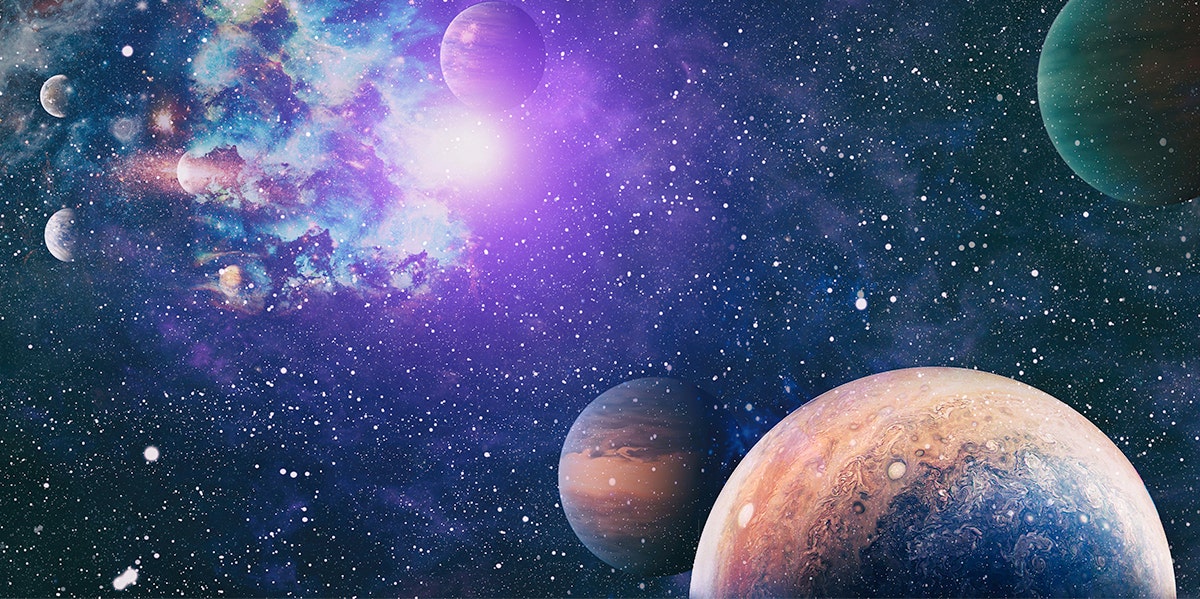How To Defend Your Belief In Astrology When People Say It's Fake
Learn, explore, and expand your mind.
 Zakharchuk / Shutterstock
Zakharchuk / Shutterstock Many people think horoscopes or natal charts are complete garbage, but have never looked further than clickbait articles and personality tests.
While we can respect others who have performed some semblance of research and then thoughtfully decided to disregard it, as for everyone else who discredits it as pseudoscience and refuses to research, it's mind-boggling.
"Astrology has been becoming increasingly popular as, collectively, we search for what defines 'more' in all of our lives outside of any specific doctrines," author and spiritual astrologer Kate Rose explains.
"It seems astrology is more of a religion now than just a belief, as it’s a practice of being not just more in touch with the world around us, but also within the flow of life."
Is astrology real?
There are people out there who are believers. But there isn't a single piece of evidence that scientifically proves astrology is real.
A series of scientific studies showed a relevance between personality and your birth month.
One study determined that individuals born in the months December, January and February have "lower agreeableness." Another study out of Sweden found that those with birthdays in February, March and April had "increased novelty-seeking behavior." And a third study determined that men born in the summer are "less conscientious."
However, these studies don't correlate with astrology; rather, with events on earth like disease levels, temperature, pollen in the air, and consequent disease exposure — things that vary seasonally.
Yet people still hold tight to their natal charts with eager hands.
Can astrology be true?
Scientifically, astrology has never been proven, but it dates back to the BC era.
Though it's technically a pseudoscience, astrologers believe that your natal chart is an imprint of the position of the stars and planets at the exact moment of your birth.
It isn't mysterious in any way; it's based on real objects in our universe.
One common misconception about astrology is that it predicts the future. This is not true. Astrology and horoscopes are used as guiding tools to empower and encourage you to make conscious decisions.
"Many things can be debated; however, the existence or non-existence of planets and the Moon is one that most people don’t participate in. It’s an accepted truth," Rose says.
"Believing or not believing in astrology doesn’t change the effect the Moon has on the tides; the same is true for us. If the Moon can affect the world's oceans, which cover the majority of our planet, then surely it affects ours."
How is astrology so accurate?
Astrology is accurate due to planetary calculations, cycle patterns, and coincidences the universe made.
This may have something to do with Carl Jung, the psychiatrist and psychoanalyst who founded analytical psychology. In his studies, he determined that the Zodiac worked as a compendium of psychic realities.
That is, Jung thought they made up "archetypes," which is more than a literary tool of analysis.
Archetypes are psychological models or patterns that inhabit the collective unconscious. Jung hypothesized that each human being had an innate disposition to be who they are, and that we didn't acquire it but are born with it.
Jung's concept of synchronicity links psychoanalysis with astrology. Synchronicity refers to events that generate a coincidence.
Like when you think of a person and then you receive a text from them.
Coincidence, right? Wrong! According to Jung, the coincidences are made by invisible strings that connect everything to life events.
Jung said, "Invisible forces exist that emanate from the universe. These forces are constantly intermixing and give rise to the events that happen in a person’s life."
Are zodiac signs scientifically proven?
Many studies have said that astrology isn't scientific or true, but there is a very real history behind star signs or zodiac signs.
The Egyptians allegedly correlated constellations at specific times of the year. This idea came to fruition at around 330 BC. Then, the Greeks jumped on board, who were super into mathematics and logic, working out many of the rules for how the idea of celestial bodies and divination using planets could work.
NASA describes the logic behind the creation of the 12 zodiac signs we know of today that the Ancient Greeks made way back when:
"Imagine a straight line drawn from Earth through the Sun and out into space way beyond our solar system where the stars are. Then, picture Earth following its orbit around the Sun. This imaginary line would rotate, pointing to different stars throughout one complete trip around the Sun — or, one year.
All the stars that lie close to the imaginary flat disk swept out by this imaginary line are said to be in the zodiac. The constellations in the Zodiac are simply the constellations that this imaginary straight line points to in its year-long journey."
So, scientifically, the zodiac signs are in the stars, but whether the traits that go along with them are true is up for debate.
Leah Scher is an ENFP finishing her degree at Brandeis University. She's passionate about Judaism, poetry, film, satire, astrology, spirituality, and sexual health.
